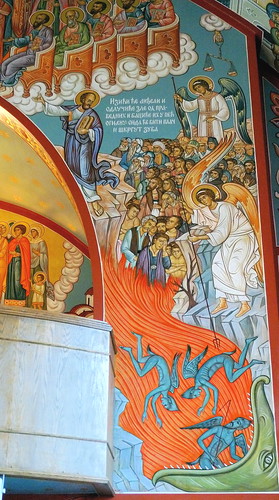
One says: you are a saint; the other: you will not be saved. Both these thoughts are from the enemy, and there is no truth in them.
Silouan of Mt. Athos here
The Psalter of David, whose sayings are as stones, doth crush the passions as they were another Goliath

 Our goal should be to take all that comes our way and make the best out of it for the sake of the spiritual struggle in which we are engaged. We must strive to acquire inner tranquility...
Our goal should be to take all that comes our way and make the best out of it for the sake of the spiritual struggle in which we are engaged. We must strive to acquire inner tranquility...
 True fasting is to put away all evil, to control the tongue, to forbear from anger, to abstain from lust, slander, falsehood and perjury. If we renounce these things, then is our fasting true and acceptable to God.
True fasting is to put away all evil, to control the tongue, to forbear from anger, to abstain from lust, slander, falsehood and perjury. If we renounce these things, then is our fasting true and acceptable to God.

St. Theognostus, here

St. Anatoly of Optina, found here


 Set me free, O God, from that multitude of speech which I suffer inwardly in my soul, wretched as it is in Thy sight, and flying for refuge to Thy mercy; for I am not silent in thoughts, even when silent in words...
Set me free, O God, from that multitude of speech which I suffer inwardly in my soul, wretched as it is in Thy sight, and flying for refuge to Thy mercy; for I am not silent in thoughts, even when silent in words...




 is concerning God, your inquiry is no simple or ordinary matter, for the Divinity is incomprehensible; and it will be sufficient for you to study the traditions of the holy apostles about Him and the teaching of the divine Fathers who followed in their steps and not trouble yourselves any further... [L]et us abstain from vain and dangerous questionings and let us each consider that which concerns ourselves... for it is written: 'Seek not out the things that are to high for thee, neither search the things that are too deep for thee.'
is concerning God, your inquiry is no simple or ordinary matter, for the Divinity is incomprehensible; and it will be sufficient for you to study the traditions of the holy apostles about Him and the teaching of the divine Fathers who followed in their steps and not trouble yourselves any further... [L]et us abstain from vain and dangerous questionings and let us each consider that which concerns ourselves... for it is written: 'Seek not out the things that are to high for thee, neither search the things that are too deep for thee.'


 has a heart aflame for the whole of creation, for humankind, for the birds, for the animals, for the devils, for every creature. When he thinks of them or sees them, he sheds tears. So strong and violent is his compassion that his heart is in anguish and he cannot bear to hear or see the slightest ill or the least sadness in the heart of creation. Accordingly, he prays with tears at every moment for the dumb animals, for the enemies of the truth and for all who do him harm, that they may be protected and forgiven. In the immense compassion which arises overwhelmingly in his heart in the image of God he prays even for reptiles.
has a heart aflame for the whole of creation, for humankind, for the birds, for the animals, for the devils, for every creature. When he thinks of them or sees them, he sheds tears. So strong and violent is his compassion that his heart is in anguish and he cannot bear to hear or see the slightest ill or the least sadness in the heart of creation. Accordingly, he prays with tears at every moment for the dumb animals, for the enemies of the truth and for all who do him harm, that they may be protected and forgiven. In the immense compassion which arises overwhelmingly in his heart in the image of God he prays even for reptiles. this stone is an icon; and I can kiss it, venerate it, because it is filled with God's grace. The world is not for us to take things from, but a place where we cast off our passions and desires.
this stone is an icon; and I can kiss it, venerate it, because it is filled with God's grace. The world is not for us to take things from, but a place where we cast off our passions and desires.